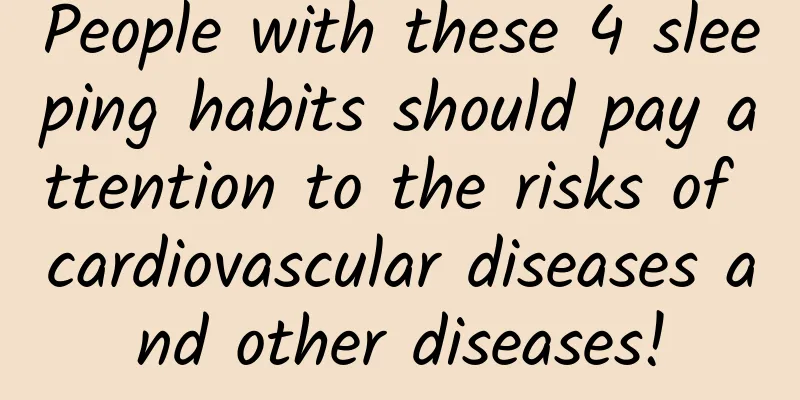People with these 4 sleeping habits should pay attention to the risks of cardiovascular diseases and other diseases!

|
I can’t fall asleep at night, so I stay up late staring at the screen of my phone; I can’t get up in the morning, and I’m reluctant to leave the bed, and I keep thinking “just lie down for one more minute”; I feel sleepy at noon, and if I don’t take a nap, I will feel listless and dizzy… Sleep problems such as insomnia, insufficient sleep, and poor sleep are bothering more and more people. Sleep, something we do every day, is not only a life requirement but also the pillar of everyone's health. Many studies have told us that sleep problems can have profound and adverse effects on physical health, mental health, emotions and public safety, and increase the risk of various chronic diseases and death, such as Alzheimer's disease, anxiety, depression, cardiovascular disease, diabetes and obesity. Recently, a study published in the Journal of the American Heart Association (JAHA) added new evidence to the importance of sleep to physical health. The study showed that insufficient sleep, excessive sleep, frequent daytime naps, and poor sleep quality can all be harmful to health and increase the risk of cardiovascular diseases such as coronary heart disease, stroke, angina pectoris, and myocardial infarction. The researchers analyzed data from the Swedish Twin Registry (STR), which included 12,268 participants. The average age of the participants was 70.3 years, and 57.4% (7,036) were female. Through the questionnaire, the researchers collected basic information about the participants, such as age, gender, height, and weight; lifestyle information, such as marital status, smoking status, alcohol consumption, diet, and physical activity; history of medical conditions and treatment of chronic diseases, such as type 2 diabetes, hypertension, and depression; and family history of cardiovascular diseases, such as coronary heart disease and stroke. In addition, the researchers collected participants' sleep information, including nighttime sleep duration, sleep type (late sleeper or early riser), as well as snoring, insomnia, and daytime sleepiness (napping) to assess the overall health of their sleep patterns. If the participant meets the following criteria for each of the five sleep indicators, the score is 1, and if not, it is 0: Nighttime sleep time: 7-9 hours; Sleep type: Morning type; Snoring: Never or rarely; Insomnia: Never or rarely; Daytime sleepiness: Never or rarely. A total score of 4-5 points indicates health; 2-3 points indicates moderate health; and 0-1 points indicates unhealthy. Statistical results show that the average nighttime sleep time of all participants is 8.5 hours; 6.8%, 52.2%, 29.4% and 11.6% of the people sleep for less than 7 hours, 7-9 hours, 9-10 hours and ≥10 hours respectively; 41.4% of the people have the habit of taking naps during the day, of which 23.6% have a nap time of ≤30 minutes; and 17.8% have a nap time of >30 minutes. Compared with people who sleep 7-9 hours a night, people who sleep less than 7 hours tend to be younger, mostly men, smokers and heavy drinkers, and their body mass index (BMI) is also higher; people who sleep ≥10 hours tend to be older, mostly women and people with type 2 diabetes. In addition, people who sleep less than 7 hours and ≥10 hours at night also have less physical activity, are accustomed to taking naps during the day, and have unhealthy sleep patterns. During an average follow-up of 13 years, a total of 4,779 participants developed cardiovascular disease, including 3,251 cases of coronary heart disease and 2,292 cases of stroke. After eliminating the influence of other factors, the researchers found that nighttime sleep duration, daytime naps and overall sleep patterns all affect the risk of cardiovascular disease. Compared to people who slept 7-9 hours a night: For those who sleep less than 7 hours, the risk of cardiovascular disease, coronary heart disease, stroke, angina pectoris and myocardial infarction increases by 14%, 17%, 13%, 14% and 22% respectively; For those who sleep ≥10 hours, the risk of cardiovascular disease, coronary heart disease, stroke and myocardial infarction increases by 10%, 10%, 11% and 13% respectively; For people who sleep 9-10 hours, the risk of cardiovascular disease, coronary heart disease, angina pectoris and myocardial infarction increases by 3%, 7%, 6% and 5% respectively. Compared with people who did not have a daytime nap habit: For those who took naps for 1-30 minutes, the risk of cardiovascular disease, coronary heart disease, stroke, angina pectoris and myocardial infarction increased by 11%, 13%, 7%, 23% and 15% respectively. For people who nap for more than 30 minutes, the risk of cardiovascular disease, coronary heart disease, stroke, angina pectoris and myocardial infarction increased by 23%, 22%, 23%, 30% and 16% respectively. Compared to people with healthy sleep patterns (scores 4-5): People with unhealthy sleep patterns (0-1 points) had a 22%, 39% and 30% increased risk of cardiovascular disease, angina and myocardial infarction, respectively; People with moderately healthy sleep patterns (2-3 points) had a 6%, 6%, 25% and 9% increased risk of cardiovascular disease, coronary heart disease, stroke and angina pectoris, respectively. In addition, the researchers also found that compared with people who sleep 7-9 hours at night and have no daytime nap habits, people who sleep less than 7 hours at night and take daytime naps for more than 30 minutes have a more significant increase in cardiovascular disease risk, which is 47%. Researchers analyzed that sleep duration and sleep quality may affect the risk of cardiovascular disease in many ways. For example, insufficient sleep and poor sleep quality may cause insulin resistance, reduced leptin secretion, increased inflammatory mediators, enhanced sympathetic nerve activity, circadian rhythm disorders, etc., which in turn will accelerate the occurrence of cardiovascular disease risk factors such as diabetes, obesity, atherosclerosis, and hypertension. The impact of daytime naps on the risk of cardiovascular disease may be related to the activation of the sympathetic nervous system, which can lead to a rapid increase in blood pressure and heart rate. If you nap too long during the day, you may enter slow-wave sleep but will not complete the normal sleep cycle, thereby disrupting the circadian rhythm. Since this study is an observational study, it only shows an association between sleep and cardiovascular disease risk, and does not indicate a causal relationship. In addition, the study also has some limitations, such as sleep data relying on participant recall, which may also affect the results of the study. The study concluded that good sleep is essential for maintaining cardiovascular health in middle-aged and elderly people. The American Heart Association (AHA) has included sleep in its recommendations for ideal cardiovascular health and recommends 7-9 hours of sleep per night. The findings of this study not only add evidence to the association between sleep and cardiovascular health, but also further show that too short or too long sleep at night, daytime naps, and unhealthy sleep patterns are all associated with cardiovascular disease risk. The researchers recommend that people should be encouraged to get between 7 and 9 hours of sleep at night and avoid frequent or excessive naps during the day. For people who do not get enough sleep at night, instead of trying to recover sleep time by taking naps during the day, it is better to create a more comfortable sleeping environment and develop healthier sleeping habits to get the best sleep time at night. For example, make sure the sleeping environment is not too hot, too cold or too noisy; reduce the time spent in front of electronic screens before bed; do not eat too much or too late for dinner; exercise more during the day; and eat a healthy diet. For people with problems such as snoring and insomnia that affect sleep time and quality, they should consult medical personnel to treat or improve related problems to prevent the occurrence of cardiovascular disease. References [1] Zhiyu Wang, et al., (2022). Association of Sleep Duration, Napping, and Sleep Patterns With Risk of Cardiovascular Diseases: A Nationwide Twin Study. Journal of the American Heart Association, DOI: 10.1161/JAHA.122.025969. [2] Study of sleep in older adults suggests nixing naps, striving for 7-9 hours a night. Retrieved Aug 2 ,2022,from https://www.heart.org/en/news/2022/07/26/study-of-sleep-in-older-adults-suggests-nixing-naps-striving-for-7-9-hours-a-night |
<<: 【Creative Cultivation Program】In fact, it is your stomach that controls your brain!
>>: What should women do if they feel stressed after giving birth?
Recommend
What is blood deficiency? What should women do if they have blood deficiency?
When women see a Chinese doctor, they are often t...
What are the common tropical fruits in life? Why should tropical fruits not be placed in the refrigerator?
There are many kinds of tropical fruits, and they...
Will cervical carcinoma in situ metastasize?
When a woman is diagnosed with cervical carcinoma...
What is the right lifestyle for women?
We always say that women must cherish themselves,...
Pros and cons of natural birth and caesarean section
When a woman is giving birth, there are generally...
Is back pain a symptom of early pregnancy?
There are many symptoms that female friends show ...
What is the reason for heel pain after abortion?
Every woman does not want to go to the hospital f...
What's a good way to get rid of wrinkles?
We all know that today's social competition i...
What is the difference between sweet potato and yam? The role of yam beef soup
Yam is a very nutritious food, belonging to the t...
Why does myocardial infarction occur?
6 warning signs before a meme comes! Remember the...
The benefits of breast care
Breast care is very important for women, because ...
Do you need to be woken up during craniotomy? What is the purpose of this?
Author: Han Ruquan, Chief Physician, Beijing Tian...
What is the best way to treat double uterus?
If a woman is found to have a double uterus durin...
How many days of bleeding is normal after an abortion?
Terminating a pregnancy by artificial services or...
What is sea buckthorn? Does sea buckthorn increase internal heat or reduce internal heat?
Seabuckthorn fruit contains fatty acids, seabuckt...









